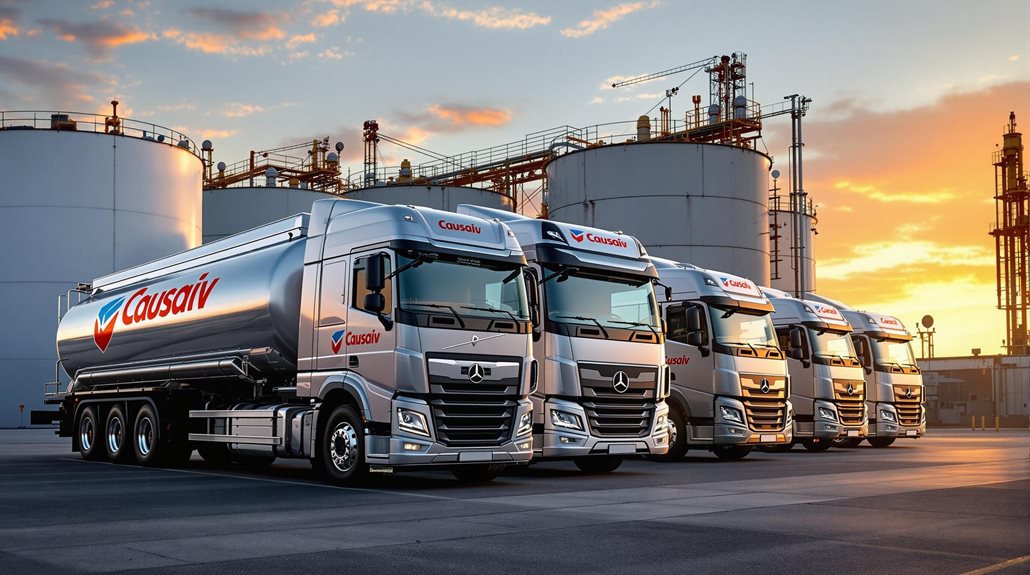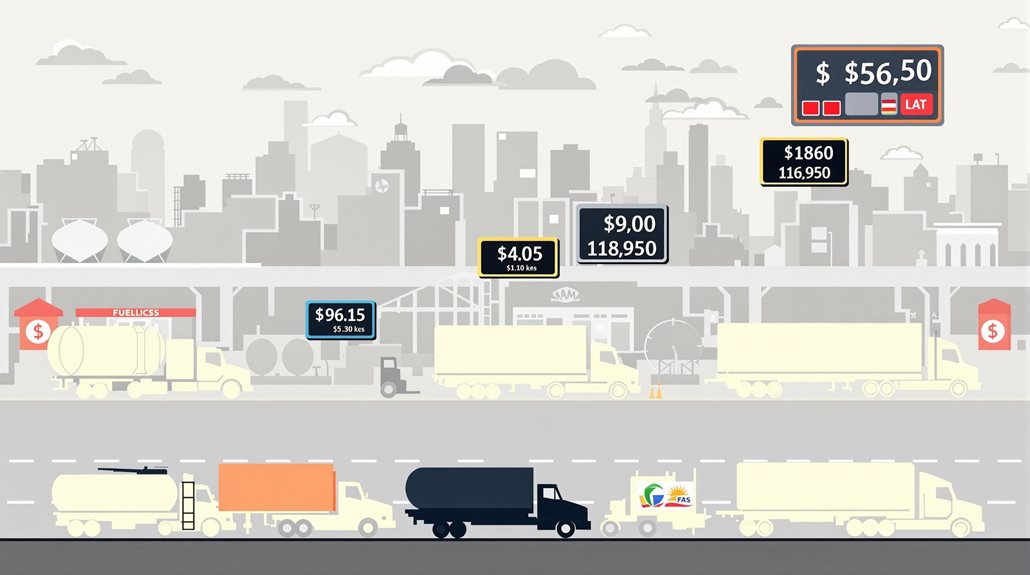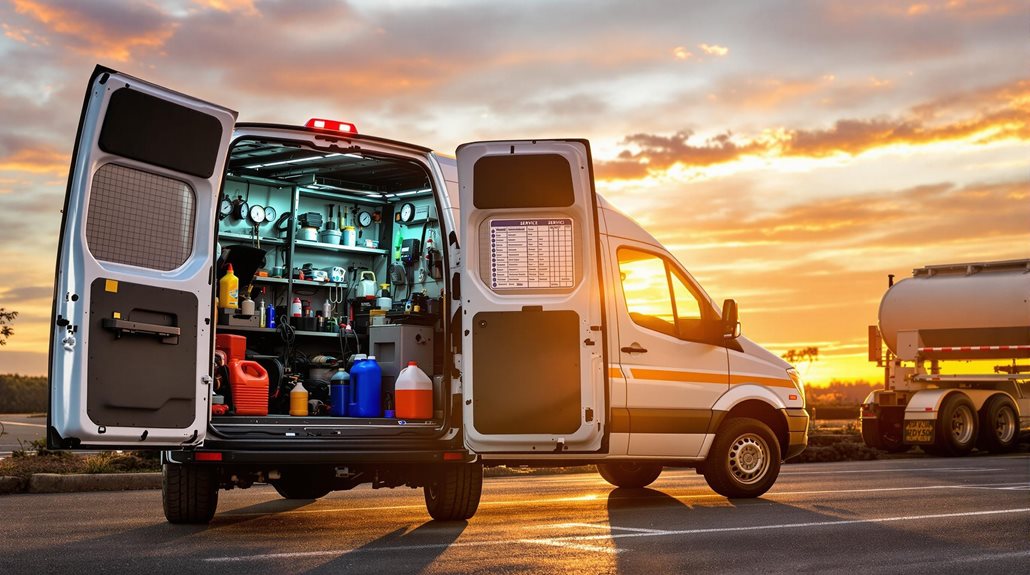Leading fuel delivery providers offer diverse service coverage and pricing models across the United States. Companies like Fuel Logic operate nationwide, while regional providers such as Shipley Energy focus on specific territories. Service options typically include subscription-based plans with volume discounts and on-demand delivery with variable pricing based on market conditions. Most providers integrate advanced technology for real-time tracking, efficient scheduling, and digital payment processing. Additional services often encompass vehicle assistance, tire changes, and fleet management solutions. The extensive range of options and technological capabilities enables businesses to select providers that align precisely with their operational requirements and cost objectives.
Expert Highlights
- Coverage areas vary significantly, with some providers offering nationwide service while others focus on specific regions or metropolitan areas.
- Pricing structures include subscription-based plans with volume discounts and on-demand services with variable market-based rates.
- Technology integration enables real-time tracking, route optimization, and automated scheduling for more efficient delivery operations.
- Additional vehicle services like tire changes and roadside assistance differentiate providers and add value beyond basic fuel delivery.
- Service availability ranges from 24/7 emergency delivery to scheduled time slots, impacting reliability and response times.
Fuel Delivery Market Leaders

The mobile fuel delivery market has seen remarkable growth, with several key players emerging as industry leaders through innovative services and technology-driven solutions. EzFill stands out as a pioneer, operating across three vertical segments and leveraging app-based technology to serve diverse customer needs in the $500 billion retail gas industry. The sector demonstrated robust performance by reaching USD 4,800.1 million in 2022. The industry currently includes 4,126 businesses actively competing in the fuel delivery space.
Booster Fuels has distinguished itself through direct-to-vehicle delivery services, while Shipley Energy emphasizes customer-centric solutions and personalized service offerings. Companies providing 24-hour roadside assistance, such as those in Minnesota, have enhanced the convenience for customers needing immediate service.
Other significant providers include Filld, which prioritizes convenience and efficiency, and InstaFuel, known for its advanced technological integration. Organizations like OCCL have carved their niche through sustainability initiatives, while international players such as Cafu demonstrate the global potential of mobile fuel delivery services through their extensive operations in the UAE.
Service Coverage By Region
Leading fuel delivery services demonstrate diverse geographic coverage across the United States, with companies like Booster Fuels and Fuel Logic maintaining nationwide networks while others focus on specific regions.
Fuel Logic operates throughout the 48 contiguous states, serving major metropolitan areas from Washington D.C. to Seattle, while Booster Fuels provides expansive mobile fueling solutions across multiple urban centers. The company offers gasoline, diesel, and renewables delivered directly to vehicles at every service location. Shipley Energy concentrates on six northeastern states, delivering thorough coverage to urban, suburban, and rural commercial customers. The company delivers 300 million gallons annually across its service region. DRIVE Roadside combines local expertise in areas like Bayonne, NJ, with nationwide diesel delivery capabilities. The service is known for its prompt and efficient service, especially during roadside emergencies.
All providers offer 24/7 emergency services, ensuring continuous fuel availability through their respective coverage areas, whether serving construction sites, fleet operations, or mission-critical facilities.
Pricing Models and Cost Comparison

Fuel delivery services typically offer both subscription-based plans with predetermined monthly costs and flexible on-demand pricing structures that accommodate occasional or emergency needs.
While subscription models often feature volume discounts and priority scheduling benefits, on-demand services incorporate variable pricing based on real-time market conditions and delivery urgency. Roadside assistance is one such service that provides essential support during emergencies, such as locking yourself out of a vehicle, and is often included in fuel delivery packages. Businesses can achieve savings by choosing local suppliers to minimize transportation costs and delivery distances. Additional services such as tank monitoring, equipment maintenance, and fleet management software integration can greatly impact the total cost structure, though these value-added features frequently justify their expense through improved operational efficiency and reduced administrative overhead.
Subscription Vs On-Demand Options
Modern fuel delivery services present customers with two primary pricing models: subscription-based plans and on-demand options. Companies like CAFU and Fuelster have developed thorough subscription services that guarantee regular fuel deliveries at competitive rates, matching the lowest prices in their respective regions.
While subscription models offer predictability and consistent service, on-demand options provide flexibility for customers with varying fuel needs. Services such as Booster, YOSHI, and Repos Energy emphasize convenience through their on-demand platforms, allowing customers to schedule deliveries at their preferred times. These providers typically maintain competitive pricing structures, with many offering rates comparable to or lower than traditional gas stations due to reduced operational costs.
The integration of IoT technology by companies like Repos Energy further optimizes delivery efficiency, potentially reducing costs for both delivery models.
Value-Added Service Costs
The complexity of value-added service costs in fuel delivery encompasses multiple pricing models and additional charges that affect the total cost to customers. Service providers typically structure their offerings through all-inclusive packages that combine essential services with premium features to maximize value while maintaining competitive pricing.
Fuel management programs offer wholesale pricing advantages and detailed consumption reporting, potentially offsetting higher initial service costs.
Premium service tiers include specialized fuel types and quality assurance measures, with pricing reflective of enhanced fuel grades.
Delivery scheduling options impact pricing, with off-peak and bulk delivery services offering cost advantages.
Additional services such as direct equipment fueling and emergency delivery command premium rates but provide operational efficiency benefits.
These value-added components create a sophisticated pricing matrix that requires careful evaluation against specific operational needs and business requirements.
Technology and Digital Solutions
Digital transformation has revolutionized fuel delivery services through advanced technological solutions that enhance operational efficiency and customer satisfaction. Modern providers integrate GPS tracking systems with route optimization algorithms, enabling real-time delivery monitoring and efficient scheduling. These technologies extensively reduce transit times while maximizing fuel efficiency across delivery fleets.
In addition to fuel delivery, many providers now offer roadside assistance services including tire changes and towing, further increasing convenience for customers.
Providers now offer extensive digital platforms that combine automated dispatching, real-time transportation visibility, and customer-facing applications. Through web portals and mobile apps, customers can manage their accounts, schedule deliveries, and track their orders in real-time. The implementation of electronic payment systems and self-service tools has streamlined transactions, while automated communication systems keep customers informed throughout the delivery process. This technological integration has transformed fuel delivery into a more transparent, efficient, and customer-centric service.
Additional Vehicle Services

Leading fuel delivery services have expanded their offerings beyond basic refueling to include thorough vehicle maintenance packages. Companies like CAFU and Yoshi have developed ideal service solutions that address multiple aspects of vehicle care, integrating maintenance with their core fuel delivery operations.
These services streamline vehicle upkeep for busy professionals and fleet managers who value efficiency and convenience.
In Minneapolis-St. Paul, these enhanced services often accompany other roadside assistance offerings, such as 24/7 car jump start service by local providers, ensuring motorists are never stranded due to a drained battery.
- Engine maintenance services, including oil changes and battery checks, ensuring prime vehicle performance
- Exterior care solutions, comprising car washes and windshield cleaning for enhanced vehicle appearance
- Essential safety services, featuring tire changes, pressure checks, and wiper blade replacements
- Customizable maintenance schedules that align with customers' specific needs and preferences, allowing for better vehicle care planning
Fleet Management Solutions
Modern fleet management solutions incorporate sophisticated hardware and software systems that revolutionize fuel delivery operations. Through integrated technologies like GPS Odometer Senders and Automatic Vehicle Identification, fleet managers can maintain exhaustive oversight of their fuel consumption patterns and vehicle movements in real-time.
These systems seamlessly combine automated pump control, tank gauging, and secure payment processing while providing detailed analytics through AI-powered dashboards. The integration extends to existing fleet management platforms, enabling organizations to track fuel usage, monitor delivery schedules, and generate extensive reports.
Advanced security features prevent unauthorized fueling through driver verification protocols and EMV-compliant payment processing, while automated data capture eliminates manual entry errors and provides foolproof accountability measures for all fuel transactions. Dinkytown's vibrant energy contributes to the dynamic needs and challenges in implementing fleet management solutions, especially for operations near bustling areas like the University of Minnesota.
Roadside Assistance FAQ
What Happens if There's a Fuel Spill During Delivery?
Professional service teams immediately implement emergency response protocols, contain the spill using specialized equipment, notify authorities, and conduct thorough cleanup while ensuring compliance with environmental regulations and safety standards.
Are Fuel Delivery Services Available During Extreme Weather Conditions?
Professional fuel delivery services operate 24/7, even during extreme weather conditions like hurricanes and floods, ensuring continuous operations through dedicated trucks, guaranteed supply, and emergency response capabilities.
Do Providers Offer Emergency Fuel Delivery Outside Regular Service Hours?
While many providers offer on-demand delivery, only Diesel Direct explicitly guarantees 24/7 emergency services. Others may accommodate urgent needs, but availability outside regular hours isn't consistently specified.
How Long Does a Typical Fuel Delivery Take From Order Placement?
Standard fuel delivery typically occurs within one week of ordering, while emergency services can provide same-day or next-day delivery. Scheduled deliveries are arranged based on your operational requirements.
What Safety Certifications Do Fuel Delivery Drivers Need to Have?
Fuel delivery drivers must possess HAZMAT certification, DOT training, and fleet safety certifications. These include proper handling of hazardous materials, emergency response protocols, and defensive driving qualifications for safe operations.
